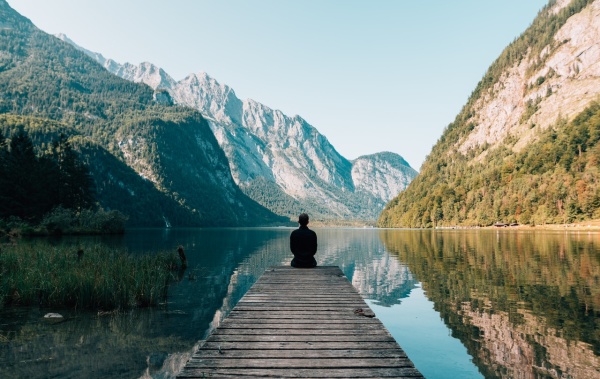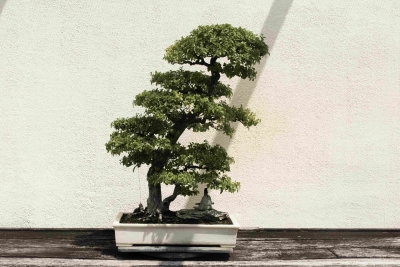
Can technology help us deal with depression and anxiety?
Romain Sourdiaux is a co-founder and Chair of the Board at Medito Foundation. He is also a Product Designer currently working on a European Commission-funded project in Amsterdam, Netherlands. He became passionate about meditation and wellbeing while looking for something that could help him fight depression. Seeing the positive effects meditation had on himself and others, he genuinely believes that everyone should be able to learn and use this practice for free.
Since I was a kid, or for the past 25 years of my life, I have seen my mum affected by this worldwide problem affecting more than 300 million people of all ages: depression.
Depression is the leading cause of disability worldwide, and is a major contributor to the overall global burden of disease. I've seen my mum in a lot of different moods reflecting a depressive state. From continuous sadness, very low self-esteem, feeling hopeless, not getting any enjoyment out of life, feeling anxious and worried, having suicidal thoughts to even trying to harm herself.
I remember being a kid, and thinking that she was "slowly killing herself with her mind".
It wasn't until 2014, that I really understood what my mum was going through. I was going to university in Paris, but somehow I got lost in those complicated and dark thoughts and ended in a depressive state too. So lost that I stopped going to class, couldn't go to my part time job any more. I lost a lot of my friends and the situation was affecting my relationship too.
Thanks to my parents, some friends and my partner at the time, I got the chance to consult a psychologist and psychiatrist, starting with therapy without medical treatment, and after a few weeks I was told to try different medicines to treat the symptoms of bipolar disorder, ADHD and depression, but they didn't really know what to diagnose me with.
Around this time I lost my best friend and it didn't improve the situation.
I had the privilege to go to the UK and stay with my uncle, to see if I could get better. Later, I met my current partner, with whom I discovered meditation.
We received a recommendation from a few friends to try a meditation app called Headspace. I was particularly sceptical as I had gone through "experts" and it didn't really help...
How could an app help me feel better mentally?
After using the app multiple times, we decided to subscribe to it and a few others like it. Waking Up by Sam Harris also caught our eye. I wasn't expecting any results, but with time, by simply "listening to my breathing", and understanding how my mind might work, it helped improve my mental state. It helped me get out of those repetitive thoughts, and this depressive state.
Later, we realised that meditation and mindfulness apps were getting trendy. From companies valued at billions of dollars to Headspace awaiting for the FDA to accept their meditation app to treat chronic diseases, it was becoming this huge "mindfulness/well-being" trendy market.
We soon understood why it was becoming so popular. It's because mindfulness and meditation can actually help us. They make us slow down, take a step back and view things from a different angle.
We truly believe that understanding and practising meditation and mindfulness can help us deal better with depression, some anxiety problems, stress etc.
Unfortunately, most of those apps are not free. We are living in a world where practically everything can be sold and bought. But should mental health be a commodity? We are talking about mental health here, not a meal at McDonald's or an iPhone from Apple.
Is mental health a commodity?
Well, the different companies behind those apps, with a few exceptions, seem to act like it is. You can pay from $4 to $14.99 a month to access guided meditation sessions. Some companies received billions of dollars of investment. As a private company it means they certainly have a duty to pay back their shareholders. Constantly making money in order to give some to the shareholders. Which is fine, but...
Is it really what we want for mental health? That a few make money thanks to people trying to feel better mentally? Should people have to pay for this type of product?
We don't think so.
We believe that like Wikipedia and knowledge in general, meditation and mindfulness should be something freely accessible.
"But, resources about meditation and mindfulness are already widely freely available!"
They are indeed, you can find hundreds of websites with different resources to help you meditate, be more mindful etc.
But apps are a bit different, they are making meditation and mindfulness more accessible. It makes it easier for us to discover, access, understand, apply and use meditation and mindfulness in our day to day life.
"Well, you don't have to use the paid apps then."
True, and actually we have nothing against paid apps. We think they are amazing and well made, however, we think there is a place for a free player, one that doesn't have ads, premium packs, subscriptions, fees and shareholders. One that can bring meditation to the masses. One that is made for the benefit of all.
"So it's just a meditation app?"
We started with just the idea to create a free meditation app. After spending time wondering if it was the only thing we wanted to do, we arrived at the conclusion that we wanted to be more than just that. That's why we decided to create a non-profit foundation called Medito Foundation.
"What's your purpose?"
Medito Foundation is a nonprofit which uses technological and creative means to research and develop solutions to improve and positively transform the way we experience our lives.
"What's your goal?"
Our goal is to help people cope better with depression, stress, anxiety, and any other negative state of mind.
We seek to:
Research, study and develop freely available tools to make mindfulness and meditation more accessible and understandable
Promote mindfulness, meditation and wellbeing
Contribute to reduce suffering in all its forms
"So, what about the meditation app?"
That's our first project:
We believe that mindfulness is an extremely important tool that can change our lives.
Studies show that it can reduce anxiety & stress, enhance cognition, attention & memory, improve general well-being, and a lot more.
You can harness these benefits using the simple practice of meditation. The app is freely accessible to everyone.
In the future we might, by ourselves or with partners, explore more ways to achieve our goal.
"All of this, for free? How do you make money?"
As a nonprofit we have the legal duty to not generate profits for ourselves personally. However, we are looking for donations and grants to push the project forward.
For now, we are using our personal incomes to maintain the project, along with some support from our Patrons on Patreon. And thanks to awesome volunteers, we are getting somewhere. We have a public finance page listing all our expenses, so you can see how the donations are used.
What's the status of the project?
It's going really well! We launched the app on Android and iOS just over a week ago and so far it has been downloaded more than 7,000 times. We’ve also received interest from more than 50 people who want to volunteer with us.
Today we are calling everyone that resonates with this project and what it stands for to join us in the quest to improve humanity's mental health. Good mental health is fundamental to prosper in our lives, our society, and to make sure future generations are living in the best world possible.
Such a basic thing should not be optional to begin with.
If like Romain, you’re interested in sharing your experiences with us or writing a guest post for us, send us an email via hello@mudita.com! Please feel free to get in touch via social media (send us some photos or videos too), you can find us on Facebook, Twitter and Instagram, let’s connect!
To learn more about Mudita, take a look at our website and our other posts. If you enjoyed reading this interview, please share and recommend it! We need to be online to find people who’d like to spend more time offline.
Related stories

Mindful Gift Ideas for a More Meaningful Holiday Season
Mindful gifts for a meaningful holiday: Mudita's collection inspires tranquility, sustainability, and connection. Perfect for intentional giving.

How Six Japanese Techniques Can Transform Your Life
Check out how how these six timeless Japanese techniques can transform your life in order to achieve clarity, purpose, and fulfillment in life.
The benefits of deep breathing for improved sleep quality
Breathe deeply, sleep peacefully, live mindfully.
If you'd like to receive the best stories from our blog, keep up to date with our progress and get notified about our product releases and special discounts.